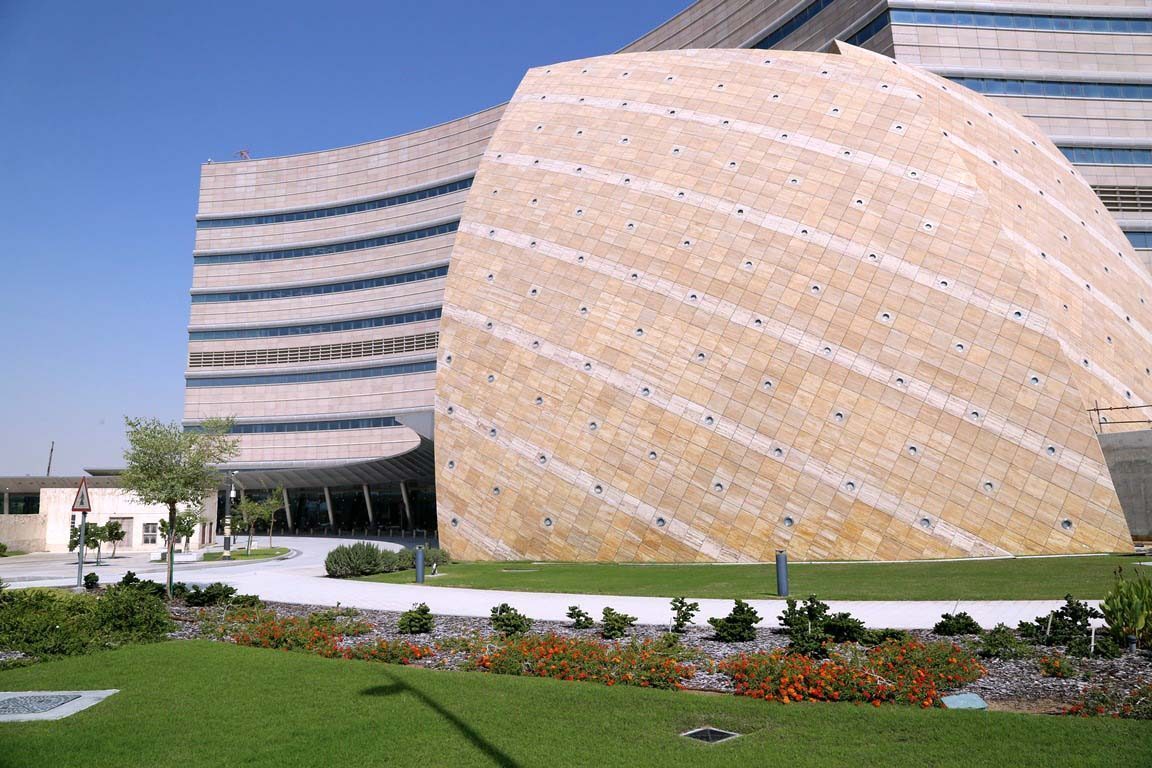
As part of an extended launch of the new outpatient department at Sidra Medical and Research Center, some six new pediatric and neonatal clinics and additional services will launch next month.
Starting June 1, clinics specializing in Neonatology, Developmental Pediatrics, Child and Adolescent Mental Health and Pediatric Plastic/Craniofacial Surgery will start taking patients who have been referred from Qatar’s state-funded health system.
New support services will also begin operations on that day, including Anesthesiology, Post-Anesthesia Care Unit (PACU) services; diagnostic imaging for Magnetic Resonance Imaging (MRI) and anesthesiology; physical and occupational therapy; speech and language pathology and audiology.
Pediatric ENT clinic and Pediatric Anesthesia pre-admissions testing will begin on June 5, a Sidra spokesperson told Doha News.
Outpatient full launch in 2017
The department first opened its doors on May 1 with three clinics – pediatric general surgery consultation; obstetrics; and dermatology. All were complemented by radiology, pathology, pharmacy and laboratory services.
Sidra plans to launch new clinics in the coming months.
By the time the roll-out is completed around January 2017, Sidra is expected to have 40 clinics at its site in Education City.
At that time, the outpatients department will be able to see up to 5,000 patients each week, or up to 260,000 a year, as part of a plan to relieve key under-pressure facilities at Hamad General Hospital.
For now, all patients attending the hospital will have to be referred there by a doctor.
Initially, this can only be done for patients who are being seen by medical staff in Qatar’s state health system – either Hamad Medical Corp. (HMC) or the Primary Health Care Corporation (PHCC).

Currently, there are no self-referrals, walk-ins or emergency facilities at the outpatient department.
Meanwhile, completion of the main hospital continues to face delays and the facility remains closed, with no official launch date yet.
Until it does open, all patients’ surgical procedures will be done at HMC hospitals.
Though Sidra had layoffs earlier this year, its chief executive Peter Morris said staff recruitment will ramp up as more clinics come on board.
“At present there are over 1,200 staff and we expect it to go up to 1,500 or a little more when the outpatient clinic becomes fully operational in early 2017,” he told Gulf Times.
Patient specialties
The Qatar Foundation-funded hospital, located next to the Qatar National Convention Center (QNCC), is designed to be a regional center of excellence for the care of women and children.

In a statement, Sidra outlined the focus of its new clinics:
Neonatology will care for pregnant women with complex and/or high-risk pregnancies including those with more than one fetus in pregnancy or where the fetus is smaller or larger than expected for its gestational age. Consultations will take place at Sidra, but for now, women will give birth at HMC’s Women’s Hospital;
The ENT clinic will support infants, children and adolescents who have otorhinolaryngology conditions, complex learning and/or physical disabilities and congenital malformations of the ear, nasal passage, oral cavity and laryngo-tracheal airway, for example. The surgeries will be undertaken by Sidra doctors at HMC hospitals;

The Child and Adolescent Mental Health clinic will be available to children and adolescents for conditions such as Attention Deficit Hyperactivity Disorder (ADHD), depression, anxiety or panic disorders; social phobia; Bipolar Disorder, psychotic disorders, Post Traumatic Stress Disorder (PTSD) and complex Autism Spectrum Disorder with behavioral issues.
Meanwhile, children and teenagers who have complex disabilities that are likely to lead to long term needs will be cared for at the Developmental Pediatrics clinic.
The Pediatric Plastic and Craniofacial Surgery will cater to children with clinic congenital and acquired conditions of the cranio-maxillofacial region (head, neck, face and jaws) and throughout the entire body.
Ares of expertise include treating cleft lip and palate, craniofacial or ear deformities, hand and extremity reconstruction for congenital and traumatic deformities, burn reconstruction, and other forms of complex reconstruction including for spina bifida and pressure sores.
And finally, in Pre-Admission Testing, patients will be assessed to ensure they are fit for surgery or sedation.
Thoughts?







